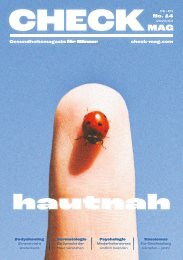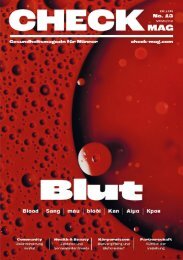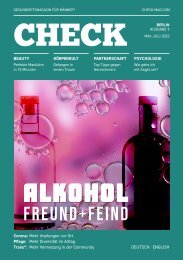CHECK Magazin - Gesundheitsmagazin für Männer No.11
Das Streben nach Leistung, Produktivität und Gewinnmaximierung steht im Fokus unserer modernen Arbeitswelt. Im heutigen Arbeitsalltag wird ein hohes Maß an Flexibilität, Kreativität, Anpassungsvermögen sowie ständige Verfügbarkeit und zugleich emotionale Belastbarkeit verlangt. Kognitiv und psychosozial werden wir stark herausgefordert. Es ist schwer, die Balance zwischen Über- und Unterforderung zu finden – beides ist gesundheitlich schädlich.
Das Streben nach Leistung, Produktivität und Gewinnmaximierung steht im Fokus unserer modernen Arbeitswelt. Im heutigen Arbeitsalltag wird ein hohes Maß an Flexibilität, Kreativität, Anpassungsvermögen sowie ständige Verfügbarkeit und zugleich emotionale Belastbarkeit verlangt. Kognitiv und psychosozial werden wir stark herausgefordert. Es ist schwer, die Balance zwischen Über- und Unterforderung zu finden – beides ist gesundheitlich schädlich.
Erfolgreiche ePaper selbst erstellen
Machen Sie aus Ihren PDF Publikationen ein blätterbares Flipbook mit unserer einzigartigen Google optimierten e-Paper Software.
Psychology<br />
SURVIVING IN A TOXIC RELATIONSHIP<br />
It becomes especially difficult when you<br />
love a narcissistic person. A relationship – in<br />
the sense of “I relate to you” – must be in a<br />
healthy balance so that a partnership can<br />
be lived harmoniously and lovingly on equal<br />
footing. A basic prerequisite for this, however,<br />
is healthy self-love: often we do not accept<br />
love because we think we are undeserving of<br />
it. Or we give up too much and ultimately give<br />
ourselves up because we’d rather be unhappy<br />
than make others unhappy. This can be like a<br />
sitting duck to narcissists.<br />
The partner may initially be ensnared<br />
in a conspicuously charming, humorous<br />
and eloquent manner, but verbal<br />
abuse occurs later if the addiction<br />
to admiration and attention is not<br />
sufficiently fulfilled.<br />
Once the narcissist dominates in the<br />
relationship, attention is repeatedly drawn to<br />
themself in conversations and the partner is<br />
“punished” through disregard and their abilities<br />
and successes are usually ignored. Even<br />
if they are supposedly proud of their partners<br />
to the outside world, this pride is more<br />
related to their own perceived attractiveness.<br />
People with strong narcissistic traits often<br />
use their partners for the fulfillment of their<br />
sexual or social desires: the so-called trophy<br />
partner serves as decoration to emphasize<br />
their own self and to get more recognition.<br />
Narcissist partners don’t allow for criticism<br />
and if it happens their partner is fiercely<br />
attacked in response. This means that after<br />
a while the partner doesn’t say anything<br />
more. The lack of courage to address things<br />
ultimately results in a loss of trust, intimacy<br />
and security.<br />
YOU CAN’T LIVE WITHOUT ME ANYWAY<br />
“You’re so sensitive,” or “You just don’t<br />
under stand me” are typical phrases that<br />
come up in these arguments. At some point<br />
you can no longer do anything right as a<br />
partner, dis cussions are fruitless and you<br />
are almost waiting for the next argument,<br />
which is often simply provoked. Of course,<br />
this also entails physical problems: stress,<br />
non- rhythmic breathing and palpitations.<br />
Stress is psychological poison: It weakens<br />
our immune system because dopamine and<br />
adrenaline are poured out over and over<br />
again and we are constantly tense. Often the<br />
narcissist then has to go further and further<br />
to induce the desired level of stress in the<br />
other person. Physical violence can become<br />
a resort here to achieve this.<br />
Warning signs of intimate partner violence<br />
range from manipulation, intimidation,<br />
humiliation, isolation, to jealousy, blackmail<br />
and making the other feel guilty. Yet even at<br />
this point, partners can still have hope that<br />
this love will get better and that everything<br />
will be fine.<br />
SETTING LIMITS AND STRENGTHENING<br />
SELF-ESTEEM<br />
If permanent insults, non-appreciation and<br />
non-fulfilment of one’s own needs occurs,<br />
a separation should be considered. You<br />
shouldn’t wait until violence occurs, but<br />
make it clear to your partner: If you don’t<br />
behave differently next time, I won’t go along<br />
with it anymore. However, you have to be<br />
consistent and really go when the line is<br />
crossed again. Of course, toxic relationships<br />
do not only take place in love relationships,<br />
but also in professional life and social<br />
networks. Here we all have to look inside and<br />
consistently set limits again and again.<br />
52 <strong>CHECK</strong> BERLIN #11<br />
Our author Michaela Medrow is a<br />
pharmaceutical representative and<br />
beautician for Witzleben Apotheken,<br />
Kaiserdamm 24+26, 14057 Berlin.<br />
www.witzleben-apotheke.de

















